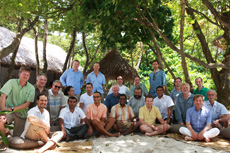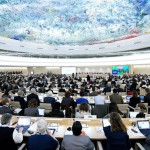Some of the world’s leading environmentalists, energy experts and economists gathered under a thatched roof, barefoot and in shorts for a conference with a difference.
The ‘Eco-Symposium’ took place over the weekend in Soneva Fushi, a luxury resort renown for its green credentials and the first in the Maldives that has pledged to go carbon neutral – by the end of this year.
Set in Baa Atoll, the 100 hectare resort grows most of its own food organically on the island, has banned any use of plastic, and provides guests with drinking water in re-usable glass bottles, produced in the island’s own bottling plant. Guests pay an additional two percent on their bills to help offset their carbon emissions.
The symposium’s stated aim was to reconcile luxury tourism with environmental sustainability. Soneva Fushi’s owner, Sonu Shivdasani, a long time environmental entrepreneur, says: “We want to present practical solutions that make both business and environmental sense. The tourism industry must realize that reconciling its business with carbon neutrality is a matter of commercial as well as planetary survival.”
Speakers at the Symposium included Jonathan Porrit, Founder and Director of Forum for the Future, Professor Geoffrey Lipman of Unite Nations World Tourism Organisation, Eric Scotto CEO Akuo Energy Group, Jeremy Legget, Founder & Chairman Solarcentury and Mark Lynus, the government’s Climate Change Advisor.
They spoke on issues including surviving climate change and profitable climate solutions, the living building challenge and improving the transportation footprint. Special guest President Mohamed Nasheed spoke on the plans to make Maldives carbon neutral by 2020.
Minivan News spoke to Mike Mason on the sidelines of the eco symposium, following his presentation on ‘Carbon neutral Maldives: foresight or folly’.
Mason is considered a world expert in environmental economics and renewable energy technologies. He is the founder of Climate Care, a voluntary carbon offset company based in UK, which he recently sold to investment bank JP Morgan. For the past six months he has been supervising an Oxford student’s Masters thesis on energy consumption in the islands of Baa Eydhafushi and Baa Maalhos.
Aishath Shazra: When you discuss going carbon neutral with Maldivians from all walks of life, you have said the most you get from them is “that’s interesting”, or “it’s a policy that will come and go.” In lieu of this, how can you change mindsets?
Mike Mason: Nobody wakes up thinking “I want to destroy the planet today.” But a lack of knowledge about low carbon technologies, and in poor countries in particular, a lack of capital, means people find it difficult to switch to renewable technologies. A poor person can’t afford to invest in something [such as solar panels] unless is gives an immediate financial return.
A two part strategy is needed to tackle this. One is by providing the best technical advice to those in power: the government, ministers,island chiefs and so on. And secondly, providing things to win hearts and minds of people, so that local people demand change.
AS: What have you learned from the data collected from Maalhos in Baa Atoll, and what does it suggest in terms of harnessing wind and solar energy?
MM: In the study of Maalhos we learned that we absolutely can make the transition to renewable energy without increasing people’s energy bills. Moreover, we can make people’s lives better in the process, by improving their fridges and cooling their houses.
We have to integrate energy and tax policies. For example, a typical fridge in the Maldives uses 10 times as much electricity as the very best fridges currently available in Europe. This costs the household money, wastes government money in electricity subsidies and damages the environment. The irony of the fridges example is that the cost to the government of changing someone’s fridge is less than the cost of subsidising the electricity the old fridge wastes.
The second thing we learned from Maalhos concerns the choices you need to make in order to provide cheap renewable energy. For example, if you only want 30 percent of your electricity to be renewable, you can do it mainly with wind, rather than solar. But if you aim to power an island with 90 percent renewable energy, you need to use all solar and very little wind.
We have to understand these issues, and work out what targets we want to hit, before we spend a lot of money on equipment.

AS: Will the scattered islands of Maldives make it a challenge to use renewable energy or can we have a one-size-fits-all solution for the islands?
MM: The scattered islands of the Maldives are not a problem in going for renewables. Renewable energy is naturally distributed and there are so few advantages to connecting isolated islands. Each island can generate its own renewable energy.
However, there are exceptions, such as where islands are densely populated, and there is no room to put up all the energy harvesting equipment that is needed, such as solar panels. In these cases we have to go for an off-island solution and possibly an electricity grid [connecting islands to one another].
Male’, for instance, should have a grid linking Thilafushi, Vilingilli, Male’ and Hulhumale’. There may be other areas in the Maldives where an electricity grid is advisable.
AS: There is no income tax in the Maldives; the government imposes import duty on goods. You have said that this could prove to be our greatest national asset on our road to carbon neutrality, how is that?
MM: Everyone in the world who is an expert in this area says one has to tax the ‘bad’ and not the ‘goods’. The Maldives has an interesting tax regime that can be used to steer people towards buying better equipment, by varying import duties depending on whether an appliance is energy efficient or not.
AS: You have said that the Maldives’ most immediate danger is not climate change but our acute vulnerability to oil price shocks. Can you explain that?
MM: In the next 10 years, the world economy is likely to grow by the same amount as it did in every year until 2010. China, India, Indonesia… these countries are experiencing tremendous growth. Economic growth is always accompanied by oil demand and oil prices have risen 10 times over the last 40 years. We have now discovered most of earth’s oil, and we are unlikely to discover new oil as fast as new demands grow. When demand exceeds supply, prices rocket. What happened two years ago [when oil prices reached US$150 per barrel], was a warning for what could happen in the future.
AS: What are the benefits for ordinary people in a country going carbon neutral?
MM: Shifting to renewable energy means you are no longer exposed to the risk of oil price shocks. It means the Maldives no longer has to worry about going bankrupt because of oil price spikes. This is as much a benefit for the government as it is for the people. Put environmental considerations aside; the Maldives should go carbon neutral for economic and energy security reasons.






That's an interesting interview, thank you for that.
Dear Aishath,
and why do you think he sold Climate Care to JPMorgan?
Maybe this gives you a clue?
http://en.wikipedia.org/wiki/Climate_Care
JPM is no charity as you might know but a Wall Street firm that is out to make money - tons of money. FYI.
@Fatumath
The reason why JPMorgan is involved is because there is money in renewable energy - precisely the point that Mr. Mason is making.
Unless there are profits to be made from renewable energy - no-one is going to invest in the technology - and there is nothing wrong with making money.
The point is that it is better to invest (and allow renewable energy to make profit) than to give the money to oil companies - who make much much more profits than a renewable energy company ever will. The profits that renewable energy companies make can go towards further developing the technology - rather than the Maldives becoming more and more dependent on oil - and leading to a drain on foreign currency for us
just look at how much money the Maldives gives to oil companies in the form of subsidies. renewnable energy is cheaper here than oil and makes us a lot safer, in every sense